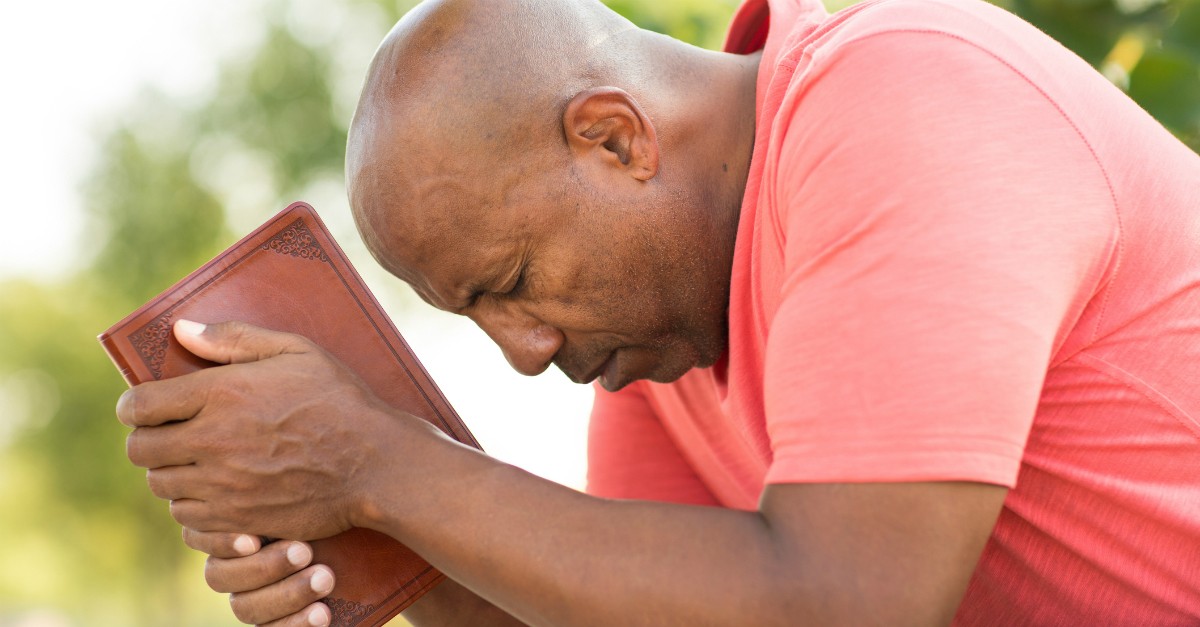
We are not immune to the pressures and hardships of life. There are times when we need to deal with the inward struggles and the storms of life that come our way.
There are things the enemy uses to attempt to block us from fellowship with God. This leads to times when we don’t feel as close to Him as we would like.
These human frailties are our willful sin, pride, anger, fears, and complacency. We’ll look at these five things that create a rift between us and God and how we can overcome them with heartfelt habits:
Photo Credit: ©GettyImages/digitalskillet

1. Seek to Obey God and Reject Sin
God made us to love Him. He created us to have fellowship with Him. But since the time of Adam and Eve people chose to sin against their Creator.
We are born with a sin nature and we all come short of God’s standard of perfection. We have not been perfect in thoughts, words, and deeds. We’ve done wrong things and disobeyed His laws.
This sin in our hearts separates us from the Holy One. Sin’s penalty is eternal death. The Bible says, “For the wages of sin is death, but the gift of God is eternal life in Christ Jesus our Lord” (Romans 6:23). Our heavenly Father loved us so much that He decided to come to us. He sent His sinless Son to pay the penalty. Jesus died a terrible death for our sins...and arose three days later.
How wonderful that when we accept this gift, our sins are forgiven and we have a new life. Anyone who believes in Him: 1) Has eternal life 2) Does not come into judgment, and 3) Has passed out of death into life. We are changed.
Now we want to grow in our relationship with our Father. We want to remain in a right relationship with Him. When we do things that do not please Him, we need to tell Him about it.
Take this opportunity to ask God to show you any sin holding you back. See if you are doing anything to put distance between you and Him.
In the middle of our failings, there is a gracious God who longs to restore our relationship with Him. Let go of this sin that displeases Him. He is giving us an opportunity—right now, and always—to restore what was lost and to change our ways.
Photo Credit: ©GettyImages/palidachan

2. Be Humble, Not Proud
Perhaps there have been times when pride and self-will have made their way into our lives.
When we exhibit prideful ways, we distance ourselves from God. Proverbs 8:13 says, “To fear the LORD is to hate evil; I hate pride and arrogance, evil behavior and perverse speech.”
The historical account of Queen Esther gives us an example of a very proud man (Esther 5:9-13). This man was Haman, a vengeful prime minister. He flaunted his riches and his prestige.
In the story of Haman, we see different kinds of pride. He showed contempt for the unfortunate. He was so arrogant that it angered him when the poor man at the gate, Mordecai, did not stand up before him to show him honor.
One day Haman called his friends and wife together to boast of his wealth and prestige. He boasted about his riches and his many sons.
He boasted about each time the king honored and promoted him above the servants and princes of the king. He told them that he was invited to Queen Esther’s banquet, while the king’s other friends were not invited. His selfish and prideful ways soon got him in trouble.
Not only does God hate pride and arrogance, He opposes people who are proud. But He gives grace to the ones who are humble (James 4:6).
We know that vanity lessens the realization of sin. We’ve seen how proud people have little interest in righteous living.
We are reminded that everything we have comes from God. Our gifts and our wisdom come from Him.
When we encounter any thoughts and attitudes of pride and self-will, we must resist them. We rely on God’s grace as we humble ourselves.
Photo Credit: ©GettyImages/Digitalskillet

3. Be Forgiving, Reject Anger and Bitterness
Anger shows itself in different ways. Sometimes we get very displeased about things. Or, without asking for it, we are faced with hurtful and disappointing situations.
Our expectations may take a hit. It may even feel like we have personally taken a punch. We may want to fight back.
This is when our reacting or responding makes a difference. We can react in self-pity, impatience, and hostility. Or we can respond in calmness, patience, and forgiveness.
The Christian attitude is one of calmness and self-control. We are made new in Christ, with a new attitude and a new way of living.
Sometimes people react to unexpected situations with anger and bitterness. Unresolved anger creates ongoing spiritual conflict. This is something that blocks our fellowship with God.
In his book Victory Over Darkness, Neil Anderson wrote about Judy, a troubled young lady in her twenties. Judy had many psychological problems. She was also a “church-hopper.” Neil Anderson agreed to counsel her. He told her he wanted to talk about what was going on in her life. He said they needed to deal with it.
He learned that Judy had been institutionalized three times in the previous five years. He learned that she had unresolved anger toward her father for many years. She had never confessed these deep emotions of anger and had repressed them. She had not vented her frustrations openly with anyone. This anger and bitterness had grown and affected her negatively.
She let these feelings have a place in her life, taking a “foothold.” The apostle Paul wrote, “In your anger do not sin. Do not let the sun go down while you are still angry, and do not give the devil a foothold” (Ephesians 4:26-27).
Judy worked through her feelings of anger and bitterness. She confessed her anger to the Lord. When she forgave her father, her life improved.
When we have baggage we’re holding on to we can’t receive the good things God wants to give us.
Photo Credit: ©GettyImages/Wenping-Zheng

4. Trust God and Don’t Give in to Fear
Sometimes we allow our fear to block our fellowship with God. Fear can hold us back and accentuate the obstacles in life. It can overwhelm us.
We may have a fear of change—like moving, or losing a job. Or maybe there’s a fear of failure, being alone, or death. There may even be anxiety from cultural events that we can’t control.
Can you think back to the times fear caused you to be ineffective and powerless? Fear is a problem of self-reliance and we find ourselves saying, “I can handle it myself.”
I recall the account of King Jehosophat. One day he heard that there was a vast army coming against him and the people of Judah. Helpless and fearful, the king said to God, his leader, “For we have no power to face this vast army that is attacking us. We do not know what to do, but our eyes are upon you” (2 Chronicles 20:12).
The king and all the people from Judah and Jerusalem came together to seek the LORD for help. Then the LORD used the Levite Jahaziel, who was among them, to respond to their pleas.
Jahaziel said, “This is what the LORD says to you: ‘Do not be afraid or discouraged because of this vast army. For the battle is not yours, but God’s’ ” (2 Chronicles 20:15). Then Jahaziel gave them instructions on what they were to do the next day. The people, trusting God for what He was going to do, rejoiced, and honored Him.
The men of Judah marched toward the vast army, but they did not need to fight this battle. They came to the place that overlooked the desert and looked toward the huge army. To their surprise, they found that the vast army had already been defeated; the soldiers had killed each other.
God does for us what we cannot do for ourselves. This is the way of victory.
There may be something that is burdening us just now. We don’t see a way of dealing with it. We can cast our fears and anxieties on the Lord.
Will we pray about it with an anxious heart or with thanksgiving? Someone wisely said, “Worrying prayer defeats its own answer; rejoicing prayer gets through.”
Photo Credit: ©GettyImages/FatmirBajrovic

5. Follow God Wholeheartedly, Don’t Settle for Complacency
When we give in to complacency, we have little hunger and thirst for God. The lack of heart devotion to Him hinders our close walk with Him. The rift we may feel with our heavenly Father is often because of our own doing.
But when we live out our faith we are not indifferent and apathetic to God’s ways. Our faith is demonstrated by our actions. We are expected to act upon our faith.
When we ask Him, God graciously gives us wisdom and revelation so we’ll know Him better. The Bible is God’s manual so we know how to navigate in life. Psalm 119:11 says, “I have hidden your word in my heart that I might not sin against you.”
Knowing God brings more joy and contentment in our lives. As our devotion to Him grows, we continue to remain close to Him.
When the work of God’s grace starts in the heart, it must continue forever. He has promised, “I will never leave you nor forsake you” (Hebrews 13:5). Nothing can separate us from His love and grace.
Photo Credit: ©GettyImages/wildpixel

Originally published Friday, 10 July 2020.
